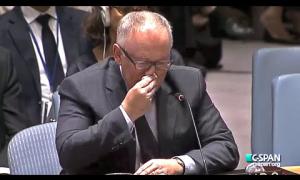Wayne’s Story: Eradicating Poverty in Canada
April 15, 2014
As a child, I thought that Wayne’s place in the world was unfair. I now appreciate that it was much worse than that. It was scandalous.
Address by DANA ROBBINS, Vice President and Group Publisher, Metroland South, Metroland Media, Inc.; delivered to the Hamilton Roundtable for Poverty Reduction, Hamilton, Ont., Canada, April 1, 2014
Wayne was my best friend through most of my boyhood.
He had an easy laugh. And it was effortless to like him.
We were the same age, but Wayne was always the leader of our small band, having mastered all the skills that boys deem essential:
He could play Smoke on the Water on his guitar;
And I still think that’s cool.
He could fillet a fish with a jack knife;
And I still think that’s pretty cool.
And, most impressively, he could perfectly imitate the sounds of the most obscene bodily functions;
And, for sure, I still think that’s especially cool.
I thought Wayne was the coolest guy in the world.
For all that, and despite his standing in our boyhood pantheon, there was always something tentative about Wayne. It was almost as if he was never quite certain that he was as much of a hero to us as was obvious to everyone else, or that he even belonged in our group.
Like a dog that’s been cuffed once too often, Wayne was oftentimes suspicious of an outstretched hand. And you sometimes had the sense that he fully expected his friends to one day abandon him.
As we one day would.
I’ve told Wayne’s story before; at one point I shared it with Spectator readers. But I thought I would retell his story today because so much of my own thinking about poverty started with Wayne.
And, also, because I know in my heart that all wisdom, no matter how modest, starts with the telling of stories. And that, of course, is what has being asked of you.
Wayne was a poor kid in the poorest neighbourhood of a very poor town. My own family was of modest, even humble, means, but Wayne’s family resided one entire, precarious rung lower on the social ladder.
I don’t think Wayne had more than one pair of jeans in all of the years that I knew him. And he was always hungry, shamelessly scrounging leftovers from friends. “Do you got anything to eat?” was his standard greeting.
At home, there was no running water, no toilet, sometimes no heat. Worst of all, there was never any hope.
Wayne knew, at an age when a child should not have such wisdom, how fragile is life.
Of the many sins that can be laid at poverty’s door, surely none is greater than the vulnerability it instills in those who have been brutalized by it; that nagging, sometimes suffocating, fear that everything you have can be taken from you.
As a child, I thought that Wayne’s place in the world was unfair. I now appreciate that it was much worse than that. It was scandalous. And it was an indictment of the community in which we both lived.
In Hamilton, we, too, stand accused.
More than 22,000 Hamilton children live in poverty, almost 8,000 of them under the age of 6. That means that 1 out of 4 of our youngest, most vulnerable citizens are being taught the lessons that Wayne learned:
- That the world is mostly indifferent to them;
- That they are not deserving of anything better;
- And that what little they have can be taken from them.
I used to tell people that I grew up poor. I’m embarrassed to admit that now. I feel a bit like the guy who reads a book review then pretends to have read the actual book.
I no longer make that claim because as challenged as my family’s fortunes may have been, my own experience bears little resemblance to the experience of poverty today.
It’s never been good to be poor. Being poor has always been the short end of society’s stick.
But the truth is that to experience poverty in contemporary Canadian society is to experience a poverty that is particularly corrosive and marginalizing.
There are many reasons why being poor today is worse than it was when I was growing up. But I think a couple factors are worth noting here.
One is the increasing polarization of Canadian society. For many Canadians of my generation, whether you were growing up poor, rich or somewhere in-between you almost certainly regularly rubbed shoulders with folks of other social stripes.
When the dentist’s son turned 8, I was invited to his birthday party; I was invited even though my Dad worked in the mine and we lived in a trailer. And no one would have thought anything odd about that.
That social interaction, that cohesion, is appreciably less common today, especially in the large cities where most of us live, where it’s quite possible for a poor child to have no meaningful contact with anyone other than other poor children.
I think it’s hard for most people to understand how small your world can be when you are a poor child growing up in poor neighbourhood.
I think the second factor aggravating contemporary poverty is a bit harder to get our intellectual arms around but speaks volumes to the marginalization of poor people.
I’m talking about the increase in personal wealth in Canadian society over the past two generations. So much affluence, so much conspicuous consumption, that Canadian society is, at times, almost unrecognizable to me.
How does that make poverty more corrosive?
It’s the juxtaposition, I suppose.
With apologies to Charles Dickens and Scrooge, ‘It is when abundance rejoices that want is felt most keenly.’
I’m not saying it’s easier to be poor when those around you are also impoverished, but it is true that to be poor when folks around you are affluent, perhaps even to excess, is particularly corrosive and damaging, and ultimately weakens the fabric of our society.
I don’t claim to have gained any great wisdom about poverty in the years since Wayne and I used to throw stones from the Howey Bay Bridge, but I’ve become convinced of a couple things.
Nothing will change until the people outside this room become convinced that change is essential. In the same way that a generation ago we became convinced that drunk driving was wrong, we need to be of one mind that systemic, entrenched poverty is unacceptable.
But how to build that consensus?
We are buffeted by two seemingly contrary headwinds:
- The first is the dearth of Canadians who have experienced poverty firsthand;
- The second is the abundance of Canadians who have experienced poverty firsthand;
In the case of the former, the majority of Canadians of the generations that have followed mine have known only affluence.
And, increasingly, that is transforming us into a society that is not rooted in personal knowledge of poverty or even want.
Certainly, Canadian society remains a “caring” culture—witness the outpouring of support following any natural disaster anywhere in the world—but increasingly it’s missing the “There-but-for-the-grace-of-God …” sensibility that informed the thinking of previous generations.
We feel sorry for the poor but we really can’t imagine how it is that they have come to be poor.
I see it in my own kids.
They are smart, thoughtful young people—compassionate and easily moved, motivated by sound values. But poverty is as foreign a landscape to them as the lunar surface.
A while back, my then 16-year-old daughter was complaining about how miserable her life is under her parents’ reign of terror.
“I wish I had grown up when you did,” she said. “You were so lucky. You had so much freedom.”
I did what every parent does when confronted by a belligerent teenager, I tried to make her feel guilty.
“Lucky?” I said, “How can you say that? You know how poor we were. You know I grew up in a trailer.”
“That’s right,” she said without missing a beat. “Your house had wheels. You were always going places.”
I tell you that story mostly for a cheap laugh at the expense of one of my children, but also to underline how difficult it is to understand poverty when you’ve not experienced it.
The best intentioned, most caring, individuals feel sympathy for the poor, but the experience doesn’t really resonate. It lacks traction.
I’d suggest to you that sympathy is dangerous.
Sympathy marginalizes.
If we’re going to make real inroads in poverty reduction, we need empathy, not sympathy.
Empathy is what prompts action and change. After a lifetime in media, I can assure you that the stories that most resonate with readers are those with which readers can make a personal connection, ones in which they can see some part of their own life reflected.
That is why the work you are doing—sharing your stories—is so crucial.
We live in the most narcissistic age in history, one increasingly defined by our inability to empathize with those around us. Your stories will help us scale those walls.
If the lack of personal experience with poverty is an obstacle with younger Canadians, the abundance of personal experience with poverty is as great an obstacle with the generations that preceded them.
The experience of people in middle-age, people of my generation, who have known poverty—even tangentially—in their own lives, distorts their perception and understanding of poverty in contemporary Canadian society.
In many cases, it gives people of my generation a misplaced confidence that they understand poverty.
For the reasons I cited earlier, I don’t think most of us do. But yet we smugly, sometimes belligerently, wonder: “If I rose above my circumstances, why can’t they?”
So this is not an easy task we’ve set ourselves, mobilizing Canadians to eradicate poverty. But we should feel great confidence.
A friend introduced me many years ago to a concept from her days in nursing, a tactic used by health-care providers when it is essential that they achieve the full and undivided attention of a patient. She said you do that by presenting “information they can’t walk away from.”
I’m confident that stories you are telling for the Roundtable Speakers’ Bureau meet the test of “information we can’t walk away from.” And for that I congratulate, and thank you.
One of the last times I saw Wayne, he was in hospital, bloodied, horribly disfigured and barely able to communicate, mere hours after a gruesomely violent suicide attempt.
There were a couple more encounters afterwards, but the centrifugal force of his life spiraling out of control eventually spun all of the old gang out of his circle, and out of his life.
Over the years, I’ve heard snippets now and then—health problems, a failed marriage, years of addiction, and Wayne’s ever-present companion, poverty.
I wish Wayne’s story had a different ending. But the legacy of poverty is rarely edifying.
Wayne the adult is a stranger to me now. But Wayne the boy—expert fisherman and builder of forts—is much on my mind today. And so, too, are the possibilities of what might have been.
Thank you.





